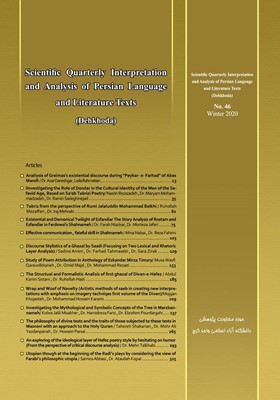Tabriz from the perspective of Rumi Jalaluddin Mohammad Balkhi
Subject Areas : Persian language and literature texts
roohollah mozafari
1
![]() ,
Iraj Mehraki
2
,
Iraj Mehraki
2
1 - PhD Student, Department of Persian Language and Literature, Karaj Branch, Islamic Azad University, Karaj, Iran.
2 - Associate Professor, Department of Persian Language and Literature, Karaj Branch, Islamic Azad University, Karaj, Iran.
Keywords: مثنوی, مولانا, Shams, Tabriz, تبریز, Masnavi, Molana, شمس, دیوان کبیر, Divan of Kabir,
Abstract :
Whatever the spiritual planet is, by the way On the ground, the secret of Tabriz's Jabin Abstract Cities represent the culture and civilization of their citizens and play a major role in the emergence of industrial and cultural structures. They worship the elders and are honored by the elders. Molana Jalaluddin mentions cities and urban structures in his works, General Shams and Mathnavi, but none has as much influence on Shams Tabrizi as Shabi and Tabriz because of Shams Tabrizi. Molana has been attracted to Shams since she was attracted to him, Its summing up of blackness clearly shames. Since then, Tabriz has become superior to the Kaaba and the Nassut and Lahout world within him, as if he sees the Tabriz raiding the Tabriz soil as if he had heard that Tabriz was the eloquence of Berkeley. The beautiful city of the 7th century, which was the capital of Ghazan Khan Timurid, is considered superior to Paradise, not the Ka'bah of Islam but the Ka'bah of both worlds, and Shams calls it the Yemeni pillar. He finds wonders in the Tabriz soil and asks travelers to bring him some Tabriz soil as a refuge so that he will eventually be buried in the Tabriz soil. In this article, the authors have tried to analyze the effects of Tabriz in Rumi's poetry by descriptive-analytical method and to find the reason for Tabriz's superiority in Rumi's mind and language.
قرآن کریم.
ابن خردادبه (1370) المسالک الممالک، ترجمۀ حسین قره چانلو، چاپ اول، تهران: مترجم.
اصطخری، ابواسحق ابراهیم (1368) مسالک و ممالک، به کوشش ایرج افشار، چاپ سوم، تهران: انتشارات علمی و فرهنگی.
افلاکی، شمس الدین احمد (1375) مناقب العارفین، به کوشش تحسین یازیچی، ج1، چاپ سوم، تهران: انتشارات دنیای کتاب.
بلاذری، احمد بن یحیی (1364) فتوح البلدان، ترجمۀ آذرتاش آذرنوش، چاپ دوم، تهران: انتشارات صدا و سیما.
خجندی، کمال (1374) دیوان، به اهتمام ایرج گلسرخی، چاپ اول، تهران: انتشارات سروش صدا و سیما.
دمشقی، شمس الدین محمد (1382) نخبه الدهر فی عجایب البّر و البحر، ترجمه حمید طبیبیان، چاپ اول، تهران: انتشارات اساطیر.
زرین کوب، عبدالحسین (1371) پله پله تا ملاقات خدا، چاپ دوم، تهران: انتشارت علمی.
سجادی، ضیاء الدین (1375) کوی سرخاب، چاپ اول، تهران: انجمن آثار و مفاخر فرهنگی.
سعدی، مصلح الدین (1389) بوستان، تصحیح غلامحسین یوسفی، چاپ دهم، تهران: انتشارات خوارزمی.
صفا، ذبیح الله (1351) تاریخ ادبیات در ایران، ج3، بخش اول، تهران: انتشارت دانشگاه تهران.
فارابی، ابونصر (1358) سیاست مدنیه، ترجمه جعفر سجادی، تهران: انتشارات طهوری.
فره وشی، بهرام (1358) فرهنگ زبان فارسی به پهلوی، چاپ دوم، تهران: انتشارات دانشگاه تهران.
فکوهی، ناصر (1381) تاریخ اندیشه و نظریه های انسان شناسی، تهران: نشر نی.
قزوینی، زکریا (1366) آثار البلاد و اخبار العباد، ترجمه عبدالرحمن شرفکندی، چاپ اول، تهران، موسسه علمی اندیشه جوان.
مستوفی، حمدالله (1378) نزهه القلوب، به کوشش محمد دبیرسیاقی، چاپ اول، قزوین: انتشارات طه.
مولانا، جلال الدین محمد (1363) کلیات شمس، تصحیح بدیع الزمان فروزانفر، ج 1و4و8، چاپ سوم، تهران: امیرکبیر.
مولانا، جلال الدین محمد (1363) مثنوی معنوی، تصحیح نیکلسون، ج3، تهران: انتشارات مولی.
نامعلوم (1362) حدودالعالم، به کوشش منوچهر ستوده، تهران: انتشارات طهوری.
یعقوبی، ابن واضع (1381) نخبه الدهر، ترجمۀ محمدابراهیم آیتی، چاپ چهارم، تهران: انتشارات علمی و فرهنگی.
_||_

